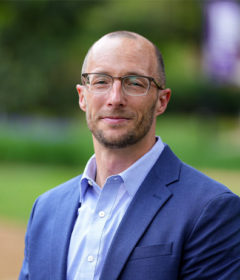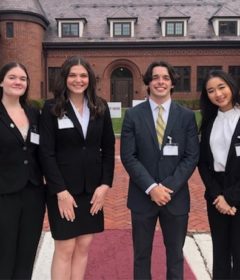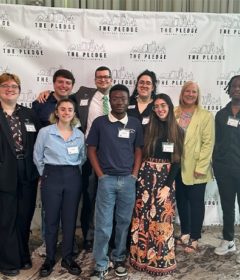The Science of Challenging Self
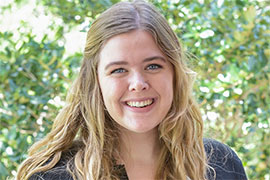
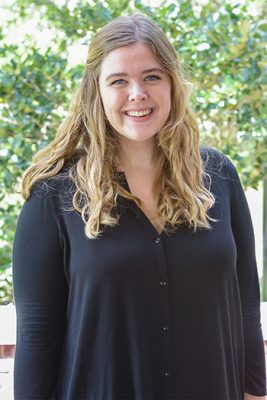
Sarah Hollmann was never afraid to dive in head first at Stetson, such as taking an upper-level political science course during her second semester as a first-year student.
Given her impressive credentials upon arriving to campus, Hollmann’s academic adviser thought it would be a “great idea” for her to take the challenge.
“And I died. It was really difficult,” Hollmann described.
Hollmann made it through, however, displaying what would become characteristic diligence and benefitting from what turned out to be patented support.
“I was in my professor’s office almost every single day, just going over the stuff that was kind of basic, but I had never gotten because I was a freshman,” Hollmann said, referring to Bill Nylen, Ph.D., professor of political science. “That was really helpful, and I ended up doing really well in that course because of the support that my different faculty members gave.”
In May, Hollmann received a bachelor’s degree in political science, with minors in Africana studies, gender studies and anthropology. Her next stop is the University of Florida, on full scholarship and with a fellowship award, in quest of a doctorate in political science.
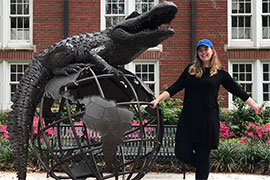
For those accomplishments, Hollmann, from DeLand, gives a huge assist to her Stetson community. While she didn’t have to travel long to get to Stetson, the support received has taken her far. “There’s no way I would be able to pursue this Ph.D. program that I’m doing next, if [it weren’t for] all the people that helped me out along the way,” she commented.
Another signature moment for Hollmann came in 2016, when she was asked to run the campaign of Bill McCullough for U.S. Congress. Initially, she had simply volunteered to help out before receiving a call from McCullough: “Sarah, do you want to project manage my campaign?”
Her response: “No, not really. I’m 21-years-old, but okay … .”
In turn, Hollmann received her own form of community help.
“A really amazing [McCullough] family and an amazing experience, because I was able to get a lot of support from my fellow students. … It was, once again, one of those Stetson things that never would’ve happened if I hadn’t been in this exact place at this exact time,” Hollmann recounted.
Notably, in the end, she also learned two valuable lessons. No. 1: “I decided that I didn’t want to go into campaign management, that was a big one.” No. 2: “I think just the knowledge that everything takes a village. You cannot do anything on your own, even if you tried to; you need people to support you and that’s integral.”
(In that political race, McCullough was defeated by incumbent U.S. Rep. Ron DeSantis. In January 2017, McCullough tragically was killed in an automobile accident.)
Finally, through integrity and excellence, Hollmann found her niche, but not before taking more chances.
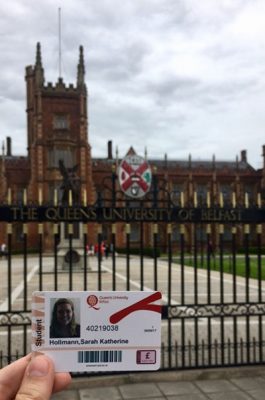
Last summer, Hollmann earned a SURE Grant from Stetson to pursue independent undergraduate research of interest (Stetson Undergraduate Research Experience). She spent a fully funded semester in Northern Ireland, where she conducted 24 interviews with ex-combatants, political figures and religious leaders.
Her research produced a senior research project called “Tribal Trenches: A Qualitative Critique of Consociational Design in Northern Ireland.”
In her investigation, Hollmann asked, how does consociational power-sharing impact ethnic divisions in Northern Ireland? She wrote: “Though those in the consociationalist school would claim that the lack of active political violence in Northern Ireland is a powerful argument in favor of consociationalism, I argue that active violence has been replaced by increasing political polarization and ethno-national tensions.”
Using data gathered from the interviews, the project “critiqued the hypothesis that ethnic divisions lose their salience after the implementation of consociational power-sharing agreements after ethno-nationalist conflict.”
Hollmann deflected credit for her project’s success. “Honestly, everybody, every professor in the [political science] department had a hand in it,” she said.
Yet, there was no conflict about the work’s merits, as Hollmann earned an invitation to participate in a May European Union Conference in California. Also, in June she traveled to Belgium and visited the European Parliament (an important forum for political debate and decision-making at the European Union level).
There was plenty of personal growth, too. According to Hollmann, she needed to learn one other lesson at Stetson: life balance. Hollmann did, of course.
“I think my biggest thing was I came onto campus and I tried to do everything all at once, and I realized that wasn’t sustainable,” Hollmann said. “So, different mentors and different friends and different professors were kind of like, ‘Sarah, why are you doing this to yourself? You shouldn’t be president of five different organizations; why don’t you try three?’ So, that really helped and that was probably my biggest barrier, realization that even though I wanted to do it all, I couldn’t.
“But that’s the great thing about Stetson; it gives you the tools to try to do it all. And then realize that it’s not sustainable and figure out what you can and cannot do.”
-Michael Candelaria

